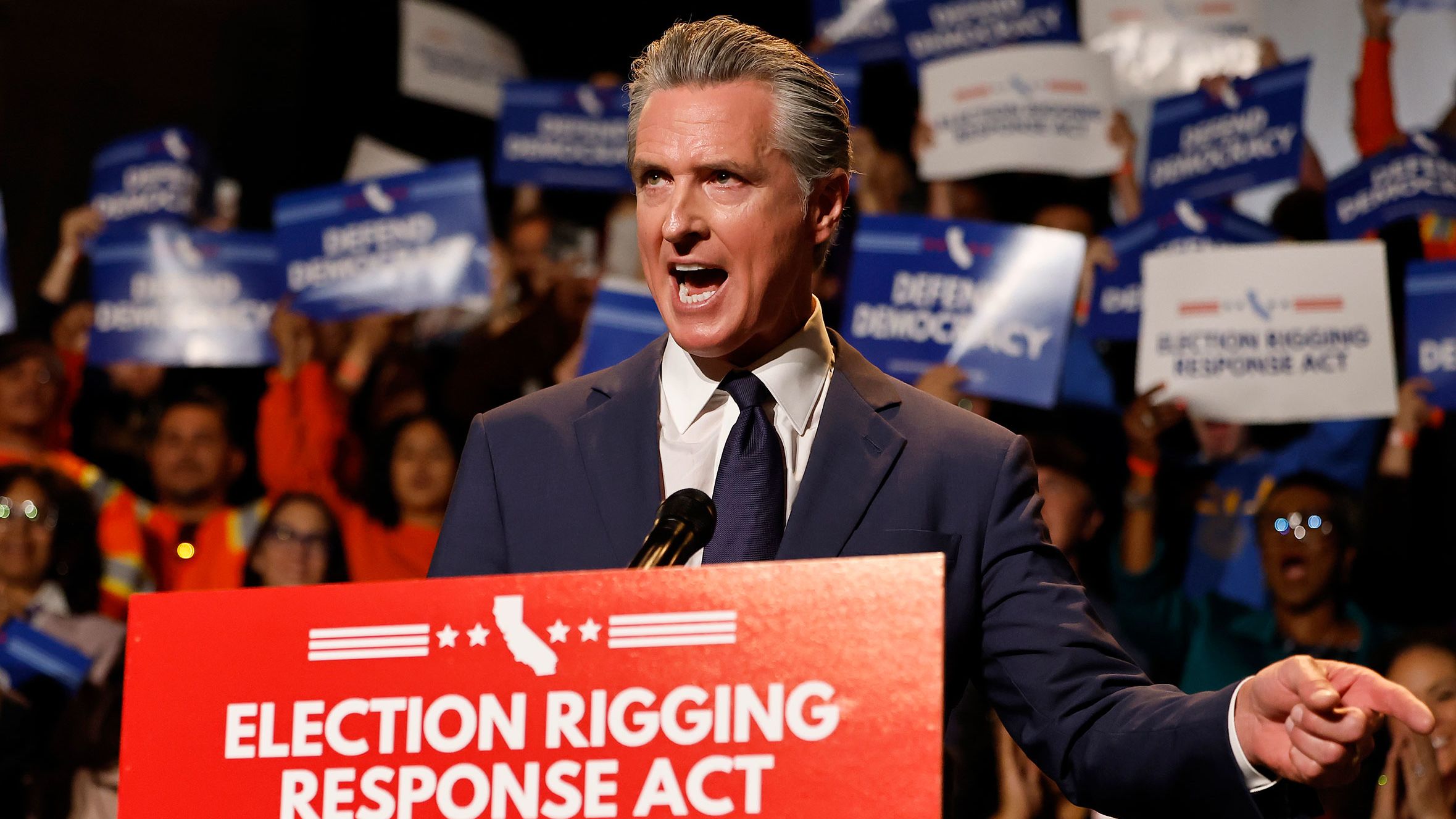
Golf legend Phil Mickelson weighs in on alleged fraud in California
Entities mentioned:
- Phil Mickelson: Righteousness, Indignation, Competitive spirit
- Donald Trump: Competitive spirit, Power, Influence
- Kevin Kiley: Righteousness, Duty, Competitive spirit
- Gavin Newsom: Self-preservation, Power, Competitive spirit
- Tim Walz: Self-preservation, Duty, Anxiety
Article Assessment:
Credibility Score: 55/100
Bias Rating: 65/100 (Lean Right)
Sentiment Score: 30/100
Authoritarianism Risk: 35/100 (Generally Democratic)
Bias Analysis:
The article leans right by giving more space to Republican viewpoints and fraud allegations. It presents Democrat responses but frames them defensively, suggesting a slight rightward tilt in narrative presentation.
Key metric: Government Efficiency and Fraud Prevention
Let me tell you something, folks - this political showdown is turning into a REAL BARNBURNER! We've got golf legend Phil Mickelson stepping up to the plate, swinging for the fences against alleged fraud in California. This is a WHOLE NEW BALLGAME, with Mickelson trading in his golf clubs for a megaphone! On the other side of the court, we've got Team Democrat led by Governor Newsom, playing defense against Trump's full-court press on fraud allegations. It's a high-stakes match where the scoreboard shows BILLIONS in taxpayer dollars on the line! Mickelson's bringing that championship mentality, calling for a timeout on new taxes until the government can clean up its act. Meanwhile, Trump's throwing Hail Mary passes, trying to connect fraud allegations across multiple states. This political arena is HEATING UP, and I'm telling you right now, we're heading into overtime with no clear winner yet! The real MVPs in this game? The taxpayers, sitting on the edge of their seats, waiting to see if their team can pull off the upset and tackle fraud head-on!

Newsom announces California redistricting push, setting up a standoff with GOP-led opponents
Entities mentioned:
- Gavin Newsom: Power, Justice, Competitive spirit
- Donald Trump: Power, Control, Influence
- Greg Abbott: Power, Control, Competitive spirit
- Arnold Schwarzenegger: Justice, Legacy, Righteousness
- Charles Munger Jr.: Justice, Influence, Legacy
- League of Women Voters: Justice, Duty, Righteousness
- Common Cause: Justice, Influence, Duty
- Steve Hilton: Ambition, Competitive spirit, Justice
- Kevin Kiley: Justice, Duty, Self-preservation
Article Assessment:
Credibility Score: 75/100
Bias Rating: 45/100 (Center)
Sentiment Score: 35/100
Authoritarianism Risk: 55/100 (Mixed/Neutral)
Bias Analysis:
The article presents multiple viewpoints and includes voices from both sides of the debate. While it gives slightly more space to Newsom's perspective, it also presents counterarguments and opposition views, maintaining a relatively balanced approach.
Key metric: Electoral Integrity
As a social scientist, I analyze that this article highlights a significant political conflict over redistricting in California, with potential national implications. Governor Newsom's push to redraw congressional maps is framed as a response to Republican efforts in other states, particularly Texas. This creates a complex dynamic where democratic principles (independent redistricting) are being challenged in the name of perceived fairness and political competition. The involvement of various political actors, advocacy groups, and former officials demonstrates the high stakes of this issue. The potential impact on Electoral Integrity is substantial, as it could affect the balance of power in Congress and set precedents for how states respond to redistricting efforts in other parts of the country. The article also touches on broader themes of partisanship, the role of independent commissions, and the tension between state-level democracy and national political strategy.

Newsom’s California redistricting push sets up a standoff with Republican-led opposition
Entities mentioned:
- Gavin Newsom: Power, Justice, Determination
- Donald Trump: Power, Control, Competitive spirit
- Greg Abbott: Power, Competitive spirit, Loyalty
- Arnold Schwarzenegger: Justice, Legacy, Righteousness
- Charles Munger Jr.: Justice, Influence, Determination
- Common Cause: Justice, Influence, Wariness
- League of Women Voters: Justice, Unity, Moral outrage
- Steve Hilton: Ambition, Justice, Competitive spirit
- Kevin Kiley: Justice, Self-preservation, Duty
Article Assessment:
Credibility Score: 75/100
Bias Rating: 55/100 (Center)
Sentiment Score: 35/100
Authoritarianism Risk: 45/100 (Mixed/Neutral)
Bias Analysis:
The article presents multiple viewpoints and includes quotes from various stakeholders, indicating an attempt at balance. However, there's slightly more space given to Democratic perspectives and framing of the issue as a response to Republican actions.
Key metric: Electoral Fairness and Representation
As a social scientist, I analyze that this article highlights a significant political conflict over redistricting in California, with potential national implications. Governor Newsom's push to redraw congressional maps is presented as a response to Republican-led efforts in other states, particularly Texas. This creates a tension between maintaining California's independent redistricting commission and strategically countering perceived gerrymandering elsewhere. The involvement of various political figures, advocacy groups, and potential legal challenges underscores the complexity of the issue. The debate touches on core democratic principles such as fair representation and the balance of power between state and federal governments. The potential impact on future elections and party control in Congress makes this a critical issue for electoral fairness and representation across the United States.

4 possible outcomes of a gerrymandering battle royale
Entities mentioned:
- Texas Republicans: Power, Control, Competitive spirit
- Democrats: Justice, Competitive spirit, Power
- Donald Trump: Power, Control, Ambition
- Supreme Court: Justice, Duty, Influence
- Texas Democrats: Justice, Determination, Righteousness
- John Cornyn: Power, Loyalty, Competitive spirit
- Kevin Kiley: Justice, Duty, Self-preservation
- Mike Lawler: Justice, Duty, Self-preservation
Article Assessment:
Credibility Score: 75/100
Bias Rating: 45/100 (Center)
Sentiment Score: 30/100
Authoritarianism Risk: 65/100 (Authoritarian Tendencies)
Bias Analysis:
The article presents multiple perspectives and potential outcomes, indicating an attempt at balanced reporting. However, there's a slight lean towards criticizing Republican actions, which is balanced by acknowledging potential Democratic responses.
Key metric: Democratic Index
As a social scientist, I analyze that this article highlights a significant threat to the democratic process in the United States through the escalation of partisan gerrymandering. The potential for a 'gerrymandering arms race' could lead to instability in representative democracy, as districts may be redrawn more frequently for political gain rather than to reflect population changes. This practice undermines the principle of fair representation and could further polarize the political landscape. The article suggests that this trend could result in a continuous cycle of retaliatory redistricting, potentially eroding public trust in the electoral system and weakening the connection between representatives and their constituents. The proposed solutions, such as legislative action or political standoffs, seem unlikely to succeed in the current partisan climate, indicating a potential long-term negative impact on the Democratic Index of the United States.

A California plan is likely the Democrats’ best option in the redistricting wars
Entities mentioned:
- Texas Republicans: Power, Control, Competitive spirit
- California Democrats: Competitive spirit, Righteousness, Power
- Gavin Newsom: Determination, Competitive spirit, Justice
- Democratic Party: Self-preservation, Power, Competitive spirit
- Republican Party: Power, Control, Competitive spirit
- Kathy Hochul: Determination, Justice, Competitive spirit
- Kevin Kiley: Righteousness, Duty, Professional pride
- Mike Johnson: Leadership, Power, Control
- JB Pritzker: Competitive spirit, Power, Influence
- David Moon: Justice, Competitive spirit, Power
Article Assessment:
Credibility Score: 75/100
Bias Rating: 45/100 (Center)
Sentiment Score: 35/100
Authoritarianism Risk: 55/100 (Mixed/Neutral)
Bias Analysis:
The article presents perspectives from both Democratic and Republican sides, attempting to provide a balanced view of the redistricting issue. However, there is slightly more focus on Democratic strategies and quotes from Democratic officials, which is balanced by critical analysis of the limitations they face.
Key metric: Congressional Seat Distribution
As a social scientist, I analyze that this article highlights the intensifying partisan battle over redistricting, with both major parties seeking to gain or maintain power through the redrawing of congressional districts. The focus on California's potential response to Texas' redistricting efforts underscores the tit-for-tat nature of this political maneuvering. This struggle significantly impacts the distribution of congressional seats, potentially altering the balance of power in the U.S. House of Representatives. The article reveals a complex landscape where some states have independent commissions to prevent gerrymandering, while others allow for more partisan control. This situation raises concerns about the fairness of representation and the integrity of the democratic process, as both parties appear willing to exploit redistricting for political gain. The potential for mid-decade redistricting in multiple states could lead to increased political instability and further erosion of public trust in electoral systems.